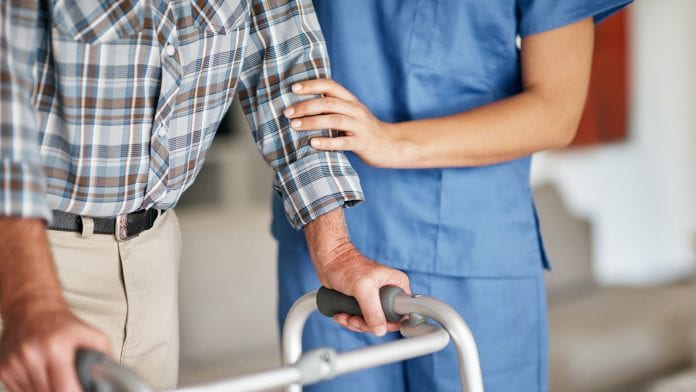
The Royal College of Occupational Therapists (RCOT) has called on the Government to protect staff working in rehabilitation services from redeployment and to provide a national strategy for rehabilitation as the health and care services in England cope with the second wave of COVID-19.
RCOT, along with some of the UK’s leading charities and associations, such as Age UK, the Alzheimer’s Society, the British Heart Foundation, the MS Society, and others, have written a joint letter to Jo Churchill MP, Parliamentary Under-Secretary of State for Prevention, Public Health and Primary Care, calling on the Government to ensure that rehabilitation services are supported to restart fully.
The letter has been sent as members continue to experience a ‘tsunami’ of demand on rehabilitation support services, and as the NHS and Social Care sector start to grapple with winter pressures.
Supporting the vulnerable
The letter highlights that as the UK enters the second, winter wave of the COVD-19 pandemic, demand on these services is only going to grow, pointing to recent data that shows 91% of people living with ‘long COVID’ will need rehabilitation in one form or another.
It also notes that people living with long-term conditions are also being denied access to essential rehabilitation services, and a recent survey by the MS Society has also demonstrated that 70% of people with MS could not see a rehabilitation professional when they needed to between start of the first lockdown and August.
The letter states: ‘As the NHS and Social Care sector start to grapple with winter pressures and the second wave of the virus, it is essential that those who are most vulnerable receive the rehabilitation support they require to avoid the long-term impact on their health and wellbeing. Rehabilitation is playing a vital role in the recovery from COVID-19, as well as being a pillar of essential support for those with long-term or progressive conditions, physical injuries and poor mental health.’
Older people becoming deconditioned and frail
The letter also draws attention to concerns regarding the wellbeing of the UK’s older population, as a recent survey by Age UK has shown that many older people are struggling with cognitive decline and the loss of mobility and balance as a result of social distancing and the lack of mental stimulation.
Another survey is highlighted, which has been conducted by Alzheimer’s Society. This revealed that there has been a reported deterioration in symptoms of 82% of the people affected by dementia.
The letter states: ‘All of these factors combined create a worrying situation that we cannot risk getting worse for their physical, mental and emotional health.
‘We recognise that the second wave will place great demand on acute services and that some redeployment might be necessary but should be kept to a minimum. To protect capacity in rehabilitation services, including backfill where redeployment cannot be avoided, local providers must be enabled to bring in additional staff on temporary contracts.’
It continues: ‘Rehabilitation is proven to facilitate hospital discharge, reduce the need for packages of care, prevent hospital admissions and reduce pressure on primary care. Conversely, denying access to rehabilitation has devastating effects upon a person’s long-term physical and mental health, leaving people dependent on care and support or unable to work, and placing significant additional pressures on the most costly parts of the health and care system.’
The organisations have called on the Government to provide a national strategy for rehabilitation to ensures these vital services are reopened with adequate staff and space.
The call asks that:
- People impacted from the first wave do not suffer further from a lack of rehabilitation support
- People that get COVID-19 can access the rehabilitation support they need to aid their recovery
- People who have non-COVID related rehabilitation needs are able to access vital rehabilitation support when and where they need it
Alongside Julia Scott – RCOT Chief Executive, other signatories include Karen Middleton CBE – Chief Executive, Chartered Society of Physiotherapy, Dr Charmaine Griffiths, CEO, British Heart Foundation, and Kate Lee, CEO, Alzheimer’s Society.
To read the full letter click here.










